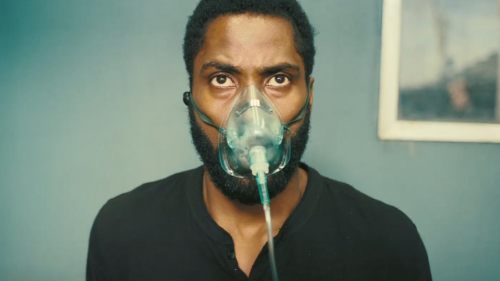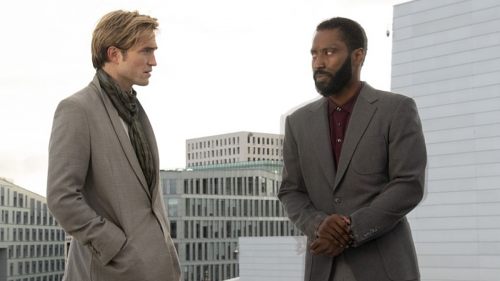INTERSTELLAR And The Ever-Evolving Mind Of Christopher Nolan
Interstellar opens today, and already moviegoers are noticing a shift from the acclaimed auteur that brought a gritty Batman back to the screen. Trailers for the upcoming film starring Matthew McConaughey have been less brooding, and more inspiring. Akin to something Steven Spielberg might have made in the '80s. A marked change from the films that Nolan started out making.
There has been a darkness in the hearts of characters that populated Christopher Nolan's films in the past. His first feature-length film, Following, involved the tale of a man who breaks into homes. He doesn’t need the money; he does it because he has no life of his own. A man so desperate for a meaningful moment, he must steal them from others. (A reflection on movie audiences, perhaps?)
Passive audiences have always vied to see morally ambivalent protagonists act on the darker impulses we all have. Yet most successful directors today cannot play on those impulses too often without losing followers. Nolan is a director who has toyed with such themes without losing his audience, drawing comparisons to another noted and respected auteur, Stanley Kubrick. Kubrick remained at an arm's length from the characters he depicted, coolly detached while harboring a sense of dread for the aftermath. Kubrick could afford to be distant with protagonists to show their faults and those of society, but he didn't work in the box-office dominated society that Nolan works in, nor was afforded the big budgets Nolan gets to play with.
Despite the bigger budgets and the current movie studio system, Nolan’s second film Memento also ends with the audience questioning the morality of its central character. Leonard is free of his puppet master, but where does a man constantly seeking revenge with an anterograde memory disorder go? If he can convince himself of Teddy’s guilt, what other hellish scenarios see themselves played out by the man with no memory? Cross him the wrong way and Leonard Shelby’s name becomes synonymous with more frightening characters like Anthony Hopkin’s Hannibal Lecter or Heath Ledger’s Joker.
Heroes and villains are not as clearly defined in Christopher Nolan’s universe. Insomnia took on the physical toll that a morally ambiguous cop faces when his past catches up with him. When Detective Dormer (Al Pacino) kills his partner in a haze-fueled accident, the pain eats at him constantly, but Walter Finch considers the event in a different light: murder is nothing more than a slight in judgment. These men are protagonist and antagonist, respectively, yet the line is drawn thinly between them.
Let us not forget that Nolan’s most popular films rely on a man split between his obligation to a city that took his parents, and an urge to simply let it die. Bruce Wayne is known by all and no one. Bruce Wayne is Batman; the actions he takes as a masked avenger are not separate of the man, rather an extension of him. He is a mask himself. This is fitting given that, as much as Bruce thinks he knows Gotham, the city pulls away from him time after time. Bruce believes his alter ego to be the savior to a city that is actively killing him. Batman is drawn a hero and villain in the eyes of Gotham, but he never takes a defined stance. Utilizing tactics like tapping all of the cities’ phones to stop a terrorist is not that far from becoming a criminal.
As anguished a character as Batman is, the darkest entry into Nolan’s filmography must be The Prestige. The Prestige introduces a conflict of morality to its audience following the reveal of The Great Danton’s last magic act. A man who could brutally murder himself in perpetuity possesses either one of the world’s most firm grasps on an afterlife, or a devilish malice that cannot bear comprehension. With Angier’s belief in God crystallized by this quote: “... the audience knows the truth, that the world is simple. Miserable. Solid all the way through. But if you could fool them, even for a second, you could make them wonder. Then you got to see something very special.” That The Great Danton was willing to go to such monstrous lengths for the entertainment of some marks him as potentially the darkest character depicted in Nolan's works.
Yet 2010 may have marked a transition for the director. Inception's lead, Cobb (Leonardo DiCaprio) is a man trapped inside of his own guilt, destined to live the same events over and over, but he is at heart a man hoping to reunite his family too. Cobb, like the aforementioned characters, is not heroic by any means, but his motives are far more pure.
Inception is not a one-off portrayal of a more hopeful protagonist; the transition continued into 2012's The Dark Knight Rises. As the minutes dwindled until the closing of Rises, many fans held their breath awaiting the moment that Batman would die. In a move that surprised some, Nolan chose to redeem Batman/Bruce Wayne and allow him to leave the city as the hero "it deserved." Commemorated in city hall, Bruce can walk away from the darkness and finally live the life his parents always wanted for him.
This growing sense of optimism marks a move away from the antiheroes of Memento to the more noble protagonists of Inception and the upcoming Interstellar. Could this mood shift mean that Nolan is switching from his Kubrick mode to something more Spielbergian? The central mission of Interstellar focuses on a team journeying through a worm hole in search of finding a planet where plant growth can be sustained. In the future established in Nolan's upcoming film, Earth has taken a devastating blow over the years, but there still lies promise in the stars above. The tone indicated in the trailer suggests a more hopeful mood than previous films. McConaughey's Cooper resembles the kind of spirited lead that hasn't been seen in Nolan's previous works. Despite the chaos present in a world ravaged by natural disasters, Cooper sees the possibilities of a better future.
Whether this tonal change is merely temporary or a conscious shift will have to be seen in future efforts, but it is an exciting forecast. And Nolan isn't just evolving in tone, but in terms of scope and ambition as well. Christopher Nolan is set on creating cinematic wonders that can't be recreated on a 70-inch television screen in living rooms, and in doing so he may bring about a renaissance in theatre attendance. In an op-ed regarding the future of cinema Nolan penned for the Wall Street Journal, it appears that optimism isn't just contained to his latest releases, but the future of cinema itself.
“The public will lay down their money to those studios, theaters and filmmakers who value the theatrical experience and create a new distinction from home entertainment that will enthrall...” Nolan writes. Reading this reminds me of waiting in a crowded line to see Inception in an IMAX theatre when it first came out. The scale and innovation of that film brought about a sheer visceral thrill that in no way can be replicated on a small screen. Moments like that are crucial to keeping the theatre-going crowds coming back and Nolan understands that. So when news broke that Nolan would be attaching an IMAX camera to a Lear jet to fly into the stratosphere for Interstellar, fans just nodded and said, "Of course."
Evolution is a necessity in filmmaking and if one wants to keep innovating, they need to shift out of their comfort zones. This kind of experimentation backed with multi-hundred million dollar budgeting is a rarity in modern Hollywood, but with the box-office track record Christopher Nolan has, that luxury gives him a lot of leeway. Such leeway may lead to something truly special, and I can't wait to see it unfold inside of my local theatre.
This was originally published in the November issue of Birth.Movies.Death. See Interstellar at the Alamo Drafthouse!



